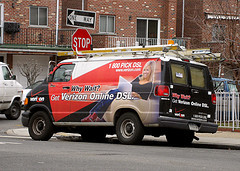Is Verizon Deliberately Slowing Down Netflix Streaming To Customers?
Cogent Communications is one of the nation’s largest bandwidth providers, and given that around 1/3 of all downstream Internet traffic in the U.S. is Netflix-related, it’s not a surprise that one of Cogent’s big clients is Netflix. Cogent has had a peering arrangement with Verizon, wherein the two providers allow the free exchange of traffic across their respective lines, but the company claims that Verizon isn’t being as peer-like as it used to be.
See, when a peering port hits around 50% capacity, it’s expected that another port will be opened up to keep things from getting congested. It’s like opening up a new checkout line at the supermarket when there’s a sudden rush. Cogent’s CEO says that Verizon is now letting these ports fill up without opening new ones.
“They are allowing the peer connections to degrade,” he claims. “Today some of the ports are at 100 percent capacity.”
Cogent says that Verizon’s explanation for the lack of cooperation is that Cogent is now providing bandwidth for large streaming video service. And we’re guessing Verizon isn’t talking about the new RedBox streaming, as Verizon owns a good chunk of that service. Come to think of it, that financial investment in a competing streaming service could be an incentive to make Netflix look bad to the end-user.
GigaOm asked Verizon about the Cogent/Netflix logjam and received the following non-response:
“Verizon operates one of America’s lowest-latency, highest capacity networks. The various classes of Internet speeds we offer are among the fastest in the nation. Time and again, customers rate us best in class in various reports and surveys. Our customers enjoy a consistently superior Internet experience because our networks can adapt and grow with their use.”
Having problems with your Netflix? You can blame Verizon [GigaOm]
Want more consumer news? Visit our parent organization, Consumer Reports, for the latest on scams, recalls, and other consumer issues.


